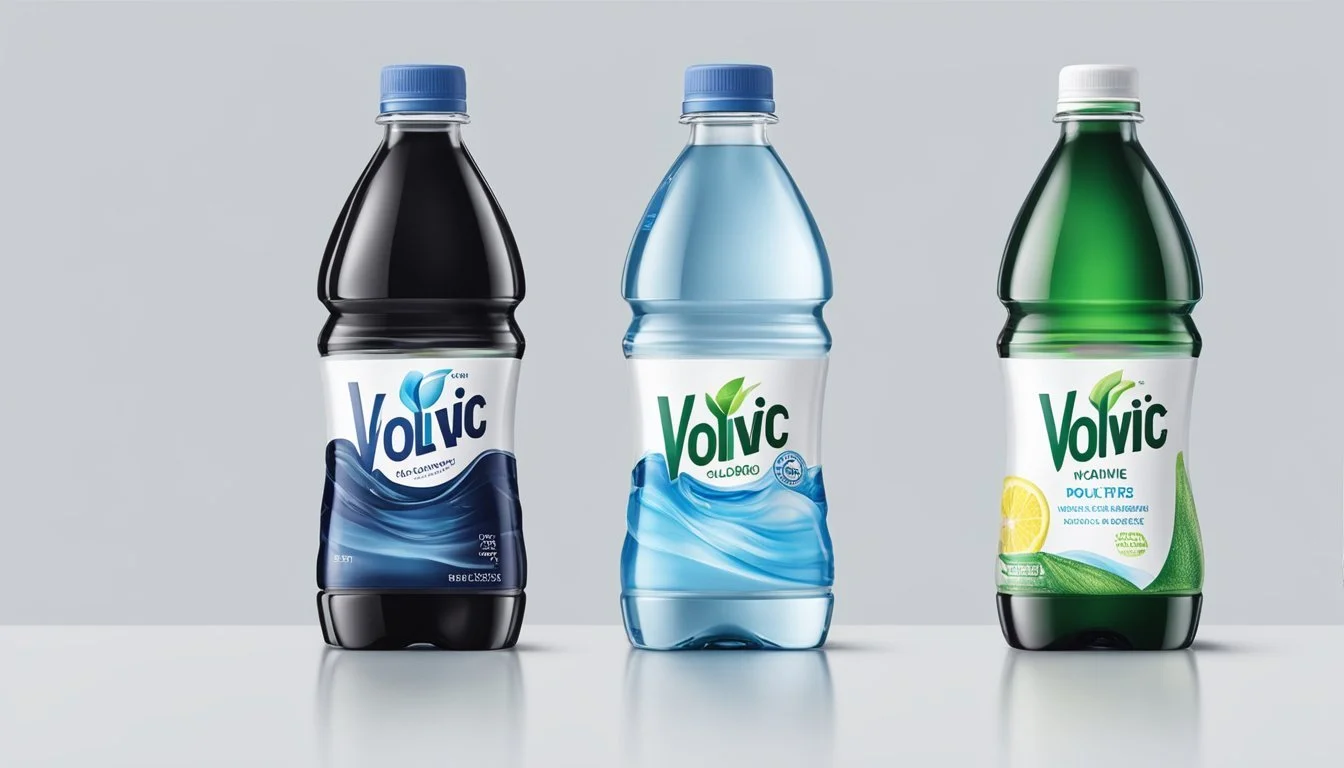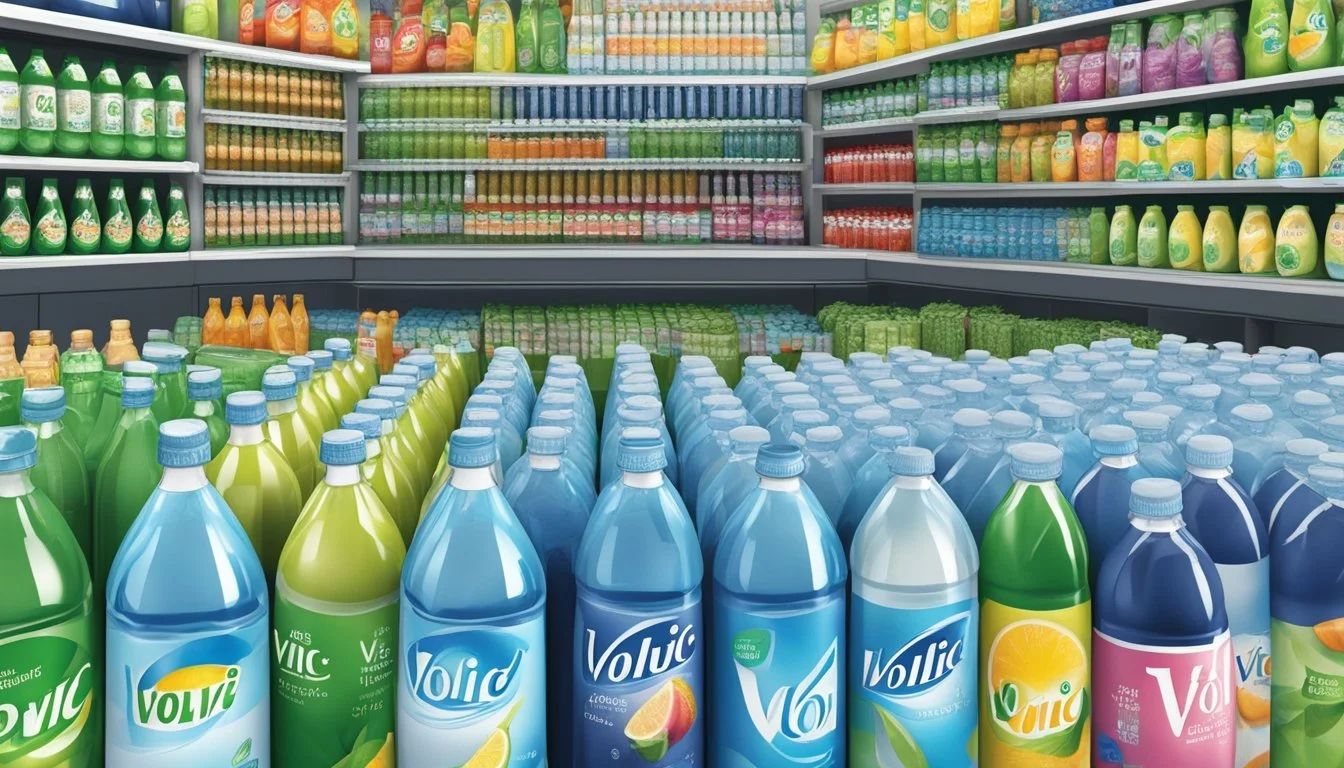Volvic vs. Blk
Comparing Purity, Taste, and Health Benefits
When it comes to bottled water brands, Volvic and Blk stand out for their unique characteristics and customer appeal. Volvic, sourced from volcanic rock in France, offers natural purity and a distinct mineral composition. In contrast, Blk water is infused with fulvic acid, giving it a striking black color and a suite of trace minerals that claim various health benefits.
For consumers seeking pure, naturally filtered water, Volvic provides a refreshing option with its volcanic filtration process. On the other hand, Blk appeals to those looking for a novel drinking experience with additional nutrients.
Which bottled water is better largely depends on individual preferences. Those prioritizing natural mineral content might gravitate towards Volvic, while those intrigued by innovative water options might prefer Blk.
Origin and Sources of Water
Volvic and Blk both come from unique sources that significantly influence their composition and taste. Understanding these origins helps distinguish the characteristics of each brand.
Volvic: Auvergne Volcanic Region
Volvic water is sourced from the Auvergne volcanic region in France. This area is known for its rich geological history and volcanic activity. Water in this region is naturally filtered through layers of porous volcanic rock, which enriches it with minerals.
Natural filtration occurs as rainwater seeps through volcanic rocks, resulting in water that is both purified and mineral-rich by the time it is collected. The process gives Volvic its distinctive slightly alkaline pH.
The main water source is natural springs in the region. These springs act as reservoirs that store the filtered water, ensuring a consistent mineral composition and taste. The geographic and geological settings of the Auvergne region play a crucial role in defining the uniqueness of Volvic water.
Blk: Sources and Filtration
Blk water is renowned for its distinctive black color, resulting from the addition of fulvic minerals. The source of Blk's water isn't as region-specific as Volvic, as Blk focuses on the infusion process rather than the geographic origin.
The water undergoes natural filtration before fulvic minerals are added. These minerals derive from decomposed plant matter and are believed to have various health benefits. This process imparts a unique set of electrolytes and trace minerals to the water without affecting its pH significantly.
Unlike Volvic, Blk water doesn’t rely on a specific natural spring or volcanic filtration. Instead, the emphasis is on the enhanced mineral content, achieved through careful infusion and filtration processes. This makes Blk stand out more for its added components rather than its natural source.
Physical and Chemical Properties
Volvic and Blk bottled waters offer distinct physical and chemical properties that appeal to different preferences and health needs. pH levels, mineral content, and natural purity are key factors in evaluating these waters.
pH Level and Alkalinity
Volvic is known for its naturally alkaline properties, with pH levels typically falling between 7 and 8. This alkalinity is beneficial for those seeking to neutralize acidity in their bodies. Alkaline water can help maintain a balanced pH, promoting overall health and well-being.
Blk water, on the other hand, has a neutral to slightly alkaline pH level. It is enriched with fulvic and humic acids, which contribute to its black color. These acids are believed to have detoxifying and anti-inflammatory properties, enhancing the health benefits of this unique water.
Mineral Composition and Health Benefits
Volvic is rich in essential minerals such as silica, calcium, magnesium, and potassium. Silica supports healthy skin and nails, while calcium and magnesium are vital for bone health. Potassium aids in proper muscle function and hydration. The mineral composition of Volvic enhances its reputation as a mineral water that promotes natural purity and hydration.
Blk water contains fulvic minerals which are sourced from ancient plant deposits. These minerals include electrolytes that support hydration and may boost nutrient absorption. The presence of these natural minerals and electrolytes can enhance physical performance and overall well-being, making Blk a unique choice for health-conscious consumers.
Taste and Palate
Volvic and Blk water offer distinct taste profiles due to their unique sourcing and mineral content. These differences cater to various consumer preferences.
Taste Profile Comparison
Volvic Water
Volvic water is known for its crisp and clean taste, which can be attributed to its filtration through volcanic rocks in the Auvergne region of France. The geological filtering process imparts a subtle mineral flavor, enhancing the water's refreshment. Consumers often appreciate Volvic for its natural and smooth palate.
Blk Water
Blk water, distinctively black due to its fulvic trace minerals, presents a unique taste profile. Its slightly earthy flavor is complemented by a hint of natural sweetness. The fulvic minerals contribute to this distinctive taste, offering an unconventional yet appealing hydration experience for those looking for something different from traditional clear bottled waters.
Health and Safety Considerations
When comparing Volvic and Blk bottled water brands, it's crucial to evaluate their health benefits and safety standards. This analysis covers important aspects such as hydration, electrolyte balance, and potential contaminants.
Hydration and Electrolytes
Volvic is known for its natural volcanic filtration, which contributes to its unique mineral composition. It contains essential electrolytes like calcium, magnesium, and potassium, helping maintain fluid balance and nerve function.
Blk water, enriched with fulvic minerals, boasts a range of electrolytes. Fulvic minerals can improve hydration and boost electrolyte balance. Both brands support overall hydration, but their distinct processes offer different electrolyte profiles.
Staying hydrated and maintaining electrolyte balance is vital for health, especially for athletes or those in hot climates. Volvic meets EPA and FDA safety standards for bottled water, ensuring it’s a reliable choice for daily hydration needs.
Contaminants and Purification
Volvic undergoes a natural filtration process through volcanic rock, reducing contaminants like chemicals and bacteria. This make it a safer option for consumers. It ensures the water remains free from harmful substances such as arsenic and chlorine.
Blk water contains fulvic acid believed to offer purification benefits. It may help filter out microplastics and other contaminants. Both brands adhere to stringent FDA safety standards ensuring quality and safety.
Understanding the purification processes and safety measures employed by these brands helps consumers make informed choices. While both adhere to required safety protocols, their differing purification methods may appeal to different preferences.
Environmental Impact and Sustainability
Volvic and Blk are both popular bottled water brands, yet their environmental impact and sustainability efforts differ significantly. Understanding their approaches to packaging, waste, and carbon footprint is essential in determining which brand may be more eco-friendly.
Plastic Bottles and Waste
Volvic uses plastic bottles made from polyethylene terephthalate (PET), which is a common plastic known for its recyclability. They have initiated efforts to utilize 100% recycled PET (rPET) in their bottles, attempting to reduce plastic waste and reliance on new plastic production.
Blk also uses PET for their plastic bottles and has similar aspirations towards sustainability. However, the availability of recyclable options may vary by region. Neither brand uses glass bottles, which are often considered more sustainable due to their reusability and lower impact on the environment over time.
Plastic waste remains a significant concern for both brands. Though PET can be recycled, a large portion of plastic bottles still end up in landfills, contributing to global plastic pollution. The choice of plastic over glass underscores the ongoing challenges in achieving complete sustainability.
Carbon Footprint and Recycling
Both Volvic and Blk have undertaken efforts to manage their carbon footprint by implementing recycling initiatives. Volvic, as a part of Danone, engages in carbon footprint management through optimized logistics and manufacturing processes aimed at reducing emissions.
Blk, known for their distinct black water, emphasizes eco-friendly practices in production. They focus on minimizing their carbon footprint via energy-efficient bottling and transportation methods.
Recycling initiatives are critical for both brands. Volvic's commitment to 100% rPET supports a circular economy, reducing the demand for new plastics. Blk's recycling programs also strive to close the loop, but their effectiveness largely depends on consumer participation and local recycling facilities.
Both brands face challenges in fully mitigating their environmental impact. The choice between Volvic and Blk may come down to regional availability of recycling options and effectiveness of their respective sustainability programs.
Market Presence and Consumer Options
Volvic and Blk are two distinct players in the bottled water market with unique offerings. They cater to a range of consumer preferences by emphasizing their sources, purification processes, and enhanced health benefits.
Comparison of Water Brands
Volvic is sourced from a natural spring in the Auvergne region of France. It is known for its purity and the natural filtration process through volcanic rock, which adds vital minerals.
Blk water is distinct for its black color, derived from fulvic trace minerals. It stands out in the market for its unique appearance and its claim of health benefits like improved hydration.
Consumers looking for standard mineral and spring water often turn to brands like Evian, Fiji, and Voss. Volvic fits well into this category, offering a mildly alkaline pH balance (around 7.0 to 7.5), which can appeal to health-conscious buyers.
In contrast, Blk water, with its unique aesthetic and functional claim, stands apart. Its blend of minerals aims to support multiple health benefits. While both brands target specific niches, they also compete with Smartwater, Essentia, Lifewtr, and others focusing on purity and added functionalities.
Enhanced and Functional Waters
The trend for enhanced and functional waters has surged with health-conscious consumers seeking added benefits. Brands like Blk with its fulvic minerals and Smartwater with added electrolytes cater to this demand.
Blk water boasts a unique, fulvic-mineral blend, which lacks traditional sweeteners or preservatives, making it appealing for those avoiding artificial additives. This focus on natural enhancement sets it apart from competitors.
For Volvic, its natural filtration process adds beneficial minerals naturally, without the need for added ingredients. Though not typically marketed as functional water, its mineral content and alkaline pH can aid in hydration and overall wellness.
Other brands like Lifewtr and Core Hydration have also leaned into added benefits with vitamins and electrolytes, emphasizing their health advantages. Whether it's the unique appearance of Blk water or the natural purity of Volvic, both have carved out specific niches in the ever-evolving bottled water market.
More About Volvic
Mountain Valley Spring Water vs Volvic: Which Bottled Water is Better?
Volvic vs Kirkland Signature: Which Bottled Water is Better?
Volvic vs Richard's Rainwater: Which Bottled Water is Better?
Volvic vs Whole Foods Italian Still Mineral water: Which Bottled Water is Better?



